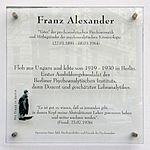Franz Alexander facts for kids
Quick facts for kids
Franz Alexander
|
|
|---|---|

Memorial in the Ludwigkirchstraße, Berlin
|
|
| Born |
Alexander Ferenc Gábor
22 January 1891 |
| Died | 8 March 1964 (aged 73) |
| Nationality | Hungarian |
| Citizenship | American |
| Known for | Psychosomatic medicine criminology |
| Scientific career | |
| Fields | Psychoanalysis |
Franz Gabriel Alexander (born January 22, 1891 – died March 8, 1964) was an important doctor and psychoanalyst. He was from Hungary and later became an American citizen. He is known as one of the people who started psychosomatic medicine. This field looks at how our minds and bodies are connected. He also helped create psychoanalytic criminology, which studies why people commit crimes using ideas from psychoanalysis.
Contents
Early Life and Studies
Franz Gabriel Alexander was born in Budapest, Hungary, in 1891. His Hungarian name was Alexander Ferenc Gábor. He came from a Jewish family. His father, Bernhard Alexander, was a philosopher. His nephew, Alfréd Rényi, was a famous mathematician.
Alexander studied in Berlin, Germany. There, he joined a group of important German psychoanalysts. They were guided by Karl Abraham. Other famous people in this group included Karen Horney and Helene Deutsch. This group often met at the Berlin Psychoanalytic Institute.
In the early 1920s, Alexander even worked with Sigmund Freud's son, Oliver Freud. He also worked with Charles Odier, who was one of the first French psychoanalysts.
Moving to America
In 1930, Robert Maynard Hutchins, who was the President of the University of Chicago, invited Alexander to teach there. Alexander became a Visiting Professor of Psychoanalysis. He worked at the Chicago Institute for Psychoanalysis. One of his students there was Paul Rosenfels.
In the 1950s, Alexander was one of the first members of the Society for General Systems Research. This group studied how different parts of a system work together. Franz Alexander passed away in Palm Springs, California, in 1964.
Understanding Human Behavior
Alexander wrote many books and articles. He explored how people's actions show their inner feelings. He looked at how people might act out their hidden tensions in real life. He called this a "neurotic character." This means a person's whole life might be filled with actions that are not realistic. Instead, these actions are meant to release unconscious stress.
He also studied the idea of a "corruptible superego." This is like an automatic, false sense of right and wrong. It can make people act in ways that are not truly moral.
Mind-Body Connection
Franz Alexander was a leader in the field of psychosomatic medicine. This area of study focuses on how our thoughts and feelings affect our physical health. Sigmund Freud was also very interested in this. He learned from Georg Groddeck, who believed that physical problems could be treated through psychological methods.
Alexander, along with Freud and Sándor Ferenczi, developed a concept called "autoplastic adaptation." They suggested that when someone faces a stressful situation, they can react in two main ways:
- Autoplastic adaptation: The person tries to change themselves or their inner feelings.
- Alloplastic adaptation: The person tries to change the situation or their outside environment.
Shorter Therapy and Emotional Healing
From the 1930s to the 1950s, many psychoanalysts wanted to make therapy shorter. They still wanted it to be effective. Alexander found that some patients benefited quickly from therapy. These patients could talk about their problems easily and express their feelings. However, these were often the healthiest patients to begin with.
Alexander also developed the idea of the "corrective emotional experience." This means that during therapy, patients can have new, positive emotional experiences. These experiences can help them heal from past negative ones. It's like learning a new, healthier way to react to situations.
This idea caused some debate among other psychoanalysts. But over time, it became a very important concept. Today, the idea of a "corrective emotional experience" is widely used in different types of therapy. It helps people understand how new experiences with a therapist can lead to positive changes.
See also
 In Spanish: Franz Alexander para niños
In Spanish: Franz Alexander para niños
- Bertram D. Lewin
- Gregory Zilboorg
- The Martians (scientists)
 | Roy Wilkins |
 | John Lewis |
 | Linda Carol Brown |

